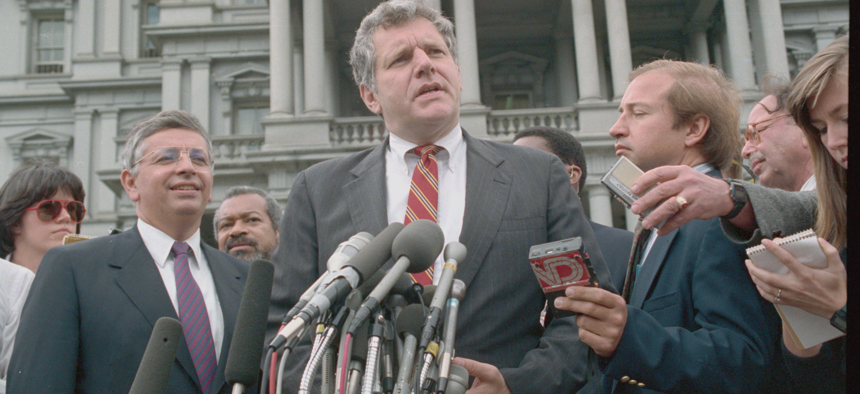That Time the Federal Government Was Ruled By Czars
How a term for Russian oligarchs came to be applied to American government officials.
The latest in an intermittent series looking back at groundbreaking, newsmaking, appalling and amusing events in government history.
On March 15, 1917, Czar Nicholas II abdicated the throne of Russia, ending its succession of autocratic rulers. But in an unlikely turn of events, the term “czar” carried on in, of all places, the United States.
The word had been previously used occasionally as an epithet to characterize power-hungry politicians. But it began to spread more widely after President Woodrow Wilson tapped Bernard Baruch to head the War Industries Board during World War I. Just a year after Nicholas II’s abdication, Baruch came to be known as the “czar of American industry.” Thus began a trend that would continue into the 21st century.
The Wikipedia entry for “executive branch czars” lists nearly 100 such titles and the individuals to whom they were applied. The use of the term is somewhat squishy, because it’s never been an official designation. It simply entered common usage to describe certain officials, whether they held established government positions or were tapped informally to coordinate the government’s response to a particular issue. Often, the “czar” designation originates in the news media. And when it is applied to individuals who are not political appointees confirmed by the Senate, they can attract controversy.
The appellation is frequently applied to people who hold positions of great national importance, such as the czars designated to respond to issues such as drug proliferation, AIDS, human trafficking and border security. In other cases, the term seems like something of a stretch. Witness the Asian Carp czar, the Great Lakes czar, the copyright czar and the weatherization czar.
According to Google’s Ngram Viewer, which measures the usage of terms in books over time, references to “czar” dropped off steeply after Czar Nicholas’ abdication, then picked up again in the early 1940s. During that period, President Franklin Roosevelt vastly expanded the powers of the federal government in both official and ad hoc fashion to fight off the effects of the Great Depression and to coordinate the national mobilization during World War II.
Roosevelt appointed about a dozen czars, including those to manage shipping, rubber production, censorship, food, prices and oil. After the war, however, the use of the term went largely dormant as presidents limited their use of such high-profile appointees. During the Nixon administration, there was a brief resurgence, especially with the designation of an energy czar during the dark days of the OPEC oil embargo and subsequent gas shortages.
Perhaps more significantly, Nixon named the first drug czar, Jerome Jaffe, in 1971. That position would become the first among equals in the czar world. Ronald Reagan’s only czar was a drug warrior, and the position attained national prominence unmatched by any czars before or since. George H.W. Bush’s drug czar, William Bennett, was a household name as drug czar. But relatively few people knew that his official title was director of the Office of National Drug Control Policy.
Bush’s successor, Bill Clinton, relied on a handful of people who came to be known as czars, but the use of the term reached new heights under President George W. Bush. The moniker was attached to more than 30 administration officials, who handled AIDS, bird flu, the federal bank bailout, nuclear cleanup and cybersecurity, among other issues.
By now, it had become established that czars were the natural response to national crises, despite the concerns of scholars that their widespread use undermined the concept of separation of powers. During the Obama administration, Republicans in Congress latched on to this argument, saying the president was thwarting congressional oversight and denying accountability through his use of specially appointed czars.
“Unfortunately—and in direct contravention of the Framers' intentions—virtually no one can say with certainty what these individuals do or what limits are placed on their authority,” then-Sen. Kay Bailey Hutchison, R-Texas, wrote in The Washington Post. “We don't know if they are influencing or implementing policy. We don't know if they possess philosophical views or political affiliations that are inappropriate or overreaching in the context of their work.”
Obama had nearly 40 officials to whom the czar appellation was applied during his two terms in office. But administration officials argued that was an illusion. “Just to be clear, the job title ‘czar’ doesn’t exist in the Obama Administration,” then-White House Communications Director Annie Dunn wrote in a September 2009 blog post. “Many of the officials cited by conservative commentators have been confirmed by the Senate. Many hold policy jobs that have existed in previous Administrations. And some hold jobs that involved coordinating the work of agencies on President Obama’s key policy priorities: health insurance reform, energy and green jobs, and building a new foundation for long-lasting economic growth.”
The suggestion that Obama’s approach was “somehow a new and sinister development that threatens our democracy” was “ridiculous,” Dunn wrote.
With the scrutiny placed on the Obama administration, the use of the czar terminology faded again. Only a handful of Trump administration officials earned the moniker, and the same has been true so far of the Biden administration. Even though the appellation appears from time to time in news reports, it just doesn’t seem to stick like it used to. And in an era when problems of a pandemic-sized nature require an all-of-government approach, the notion of a single czar solving the issue seems anachronistic. And when the term has been used recently, such as in the designation of a “cruise czar,” it hardly seems like a threat to democracy and government accountability.




